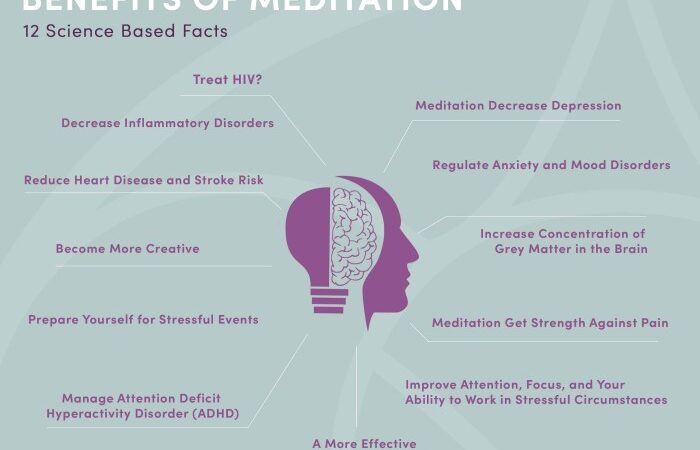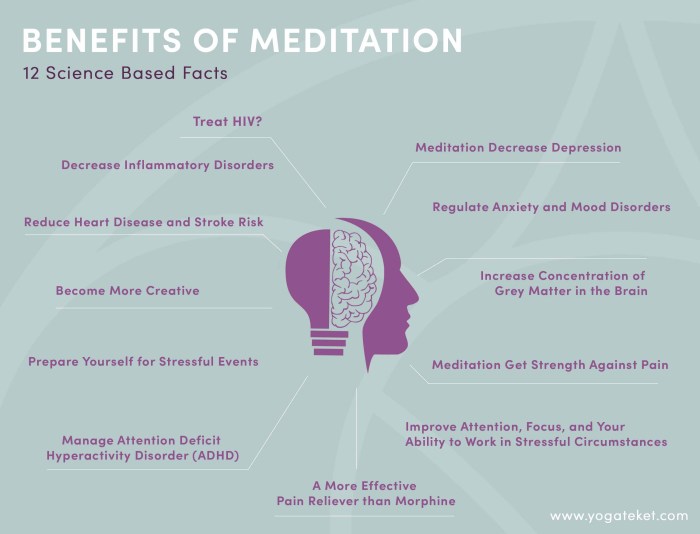Benefits of Meditation for Spirituality: A Path to Inner Peace and Connection

The benefits of meditation for spirituality offer a profound journey inward, leading to a deeper understanding of oneself and a connection with something greater. Meditation, a practice of focusing the mind and cultivating awareness, provides a pathway to inner peace, self-discovery, and spiritual growth.
Through the practice of meditation, individuals can access a reservoir of inner wisdom, cultivate compassion, and forge a more meaningful connection with the divine.
Meditation cultivates a profound sense of self-awareness, allowing individuals to observe their thoughts, emotions, and motivations with clarity. By witnessing these internal processes without judgment, individuals gain a deeper understanding of their patterns and behaviors, leading to greater self-acceptance and personal growth.
Enhanced Self-Awareness: Benefits Of Meditation For Spirituality
Meditation cultivates a deeper understanding of one’s thoughts, emotions, and motivations, leading to enhanced self-awareness. It allows individuals to observe their mental and emotional states without judgment, fostering a greater sense of clarity and insight.
Identifying Patterns of Thinking and Behavior
Meditation provides a space for individuals to observe their thoughts and emotions without getting caught up in them. This practice allows them to identify recurring patterns of thinking and behavior, including negative thought loops, emotional triggers, and habitual responses. By recognizing these patterns, individuals can gain a deeper understanding of their internal landscape and make conscious choices about how they respond to situations. For example, someone who frequently experiences anxiety might notice that their anxiety often arises when they are faced with deadlines or public speaking.
Through meditation, they can learn to identify the thoughts and emotions that precede these anxious feelings, such as worry or self-doubt. This awareness can help them develop coping mechanisms and strategies for managing their anxiety more effectively.
Personal Growth and Transformation
Self-awareness gained through meditation is a powerful catalyst for personal growth and transformation. By understanding their thoughts, emotions, and motivations, individuals can begin to challenge limiting beliefs, develop healthier coping mechanisms, and make conscious choices that align with their values.
This process of self-discovery can lead to increased self-compassion, greater emotional intelligence, and a more fulfilling life. For instance, someone who is struggling with self-esteem issues might discover through meditation that they are constantly comparing themselves to others. This realization can help them shift their focus from external validation to internal self-acceptance.
Through mindful practice, they can learn to appreciate their unique qualities and develop a stronger sense of self-worth.
Cultivating Inner Peace

Meditation is a practice that cultivates a sense of calm and tranquility, enabling us to navigate life’s challenges with greater resilience. It offers a sanctuary where we can quiet the incessant chatter of the mind and connect with a deeper sense of peace within ourselves.
The Role of Mindfulness in Reducing Stress and Anxiety
Mindfulness, a core component of meditation, involves paying attention to the present moment without judgment. By cultivating mindfulness, we become more aware of our thoughts, feelings, and bodily sensations, allowing us to observe them without getting swept away by them.
This non-judgmental awareness helps to reduce the intensity of stress and anxiety, as we learn to detach from the constant stream of worries and fears that often plague our minds.
- Increased Self-Awareness: Mindfulness helps us become more aware of our emotional triggers, allowing us to identify and manage stress before it escalates.
- Reduced Reactivity: By observing our thoughts and feelings without judgment, we learn to respond to situations with more equanimity, reducing impulsive reactions and promoting calmer responses.
- Improved Emotional Regulation: Mindfulness cultivates emotional intelligence, enabling us to better understand and manage our emotions, leading to greater emotional stability and well-being.
Benefits of Cultivating a Peaceful Mind for Emotional Well-being
A peaceful mind is a fertile ground for emotional well-being. When we cultivate inner peace, we create a sense of balance and harmony within ourselves, allowing us to navigate life’s ups and downs with greater ease and resilience.
- Reduced Stress and Anxiety: Regular meditation practice has been shown to lower levels of cortisol, the stress hormone, leading to a reduction in stress and anxiety.
- Improved Mood and Happiness: Studies have indicated that meditation can increase levels of serotonin and dopamine, neurotransmitters associated with happiness and well-being, leading to improved mood and overall sense of contentment.
- Enhanced Compassion and Empathy: Meditation cultivates a sense of interconnectedness and compassion, promoting a more understanding and empathetic outlook on life.
Deepening Connection to the Divine
Meditation, a practice rooted in ancient traditions, offers a pathway to connect with a higher power or spiritual force. It provides a space for introspection, allowing individuals to transcend the limitations of their physical senses and tap into a realm of profound spiritual awareness.
The Role of Meditation in Fostering a Sense of Awe and Wonder
Meditation cultivates a sense of awe and wonder by facilitating a shift in perspective. Through the practice of focused attention and deep relaxation, individuals can access a state of heightened awareness, enabling them to appreciate the intricate beauty and interconnectedness of the universe.
This heightened awareness can evoke a profound sense of gratitude and humility, fostering a deeper connection with the divine.
- Observing the Natural World: Meditation can enhance our ability to observe and appreciate the wonders of nature. By quieting the mind, we become more receptive to the subtle details and rhythms of the natural world, fostering a sense of awe and reverence for the divine.
- Connecting with the Divine: Meditation provides a space for connecting with a higher power or spiritual force. Through focused attention and surrender, individuals can experience a sense of presence, guidance, and love that transcends the limitations of the physical world.
Meditation’s Influence on Understanding Spiritual Beliefs
Meditation can lead to a deeper understanding of one’s spiritual beliefs by providing a space for introspection and reflection. Through the practice of mindfulness, individuals can explore their own beliefs, values, and convictions, gaining a greater understanding of their spiritual journey.
- Self-Reflection: Meditation encourages self-reflection, allowing individuals to examine their beliefs and values in a safe and supportive environment. This process can lead to a deeper understanding of one’s spiritual path and a renewed sense of purpose.
- Spiritual Insights: Meditation can facilitate spiritual insights and experiences that deepen one’s understanding of the divine. Through the practice of focused attention, individuals may receive guidance, inspiration, or a sense of connection that enriches their spiritual beliefs.
Developing Compassion and Empathy
Meditation, with its focus on cultivating present-moment awareness, offers a powerful path to developing compassion and empathy, not only for others but also for oneself. By quieting the mind and observing thoughts and emotions without judgment, meditation fosters a sense of interconnectedness and understanding.
The Role of Mindfulness in Cultivating Compassion
Mindfulness, a core element of meditation, plays a crucial role in fostering compassion and empathy. By bringing attention to the present moment without judgment, mindfulness allows us to observe our thoughts, feelings, and sensations with greater clarity. This self-awareness, in turn, promotes self-compassion, helping us to recognize our struggles and vulnerabilities with kindness and understanding.
- Increased Emotional Regulation: Mindfulness meditation has been shown to improve emotional regulation, allowing us to manage difficult emotions more effectively. This, in turn, helps us to approach challenging situations with greater equanimity and empathy, reducing the likelihood of reactive responses.
- Reduced Reactivity: By practicing mindfulness, we become more aware of our automatic reactions to situations and people. This awareness allows us to pause before reacting, giving us the space to choose a more compassionate and understanding response.
- Cultivating Empathy: Mindfulness meditation encourages us to observe the world with a non-judgmental perspective. This practice allows us to see the world from the perspectives of others, fostering empathy and understanding.
Fostering Gratitude and Appreciation
![]()
Meditation can be a powerful tool for cultivating a sense of gratitude and appreciation for the good things in our lives. By quieting the mind and focusing on the present moment, we can begin to recognize and appreciate the abundance that surrounds us.
Mindfulness and Gratitude
Mindfulness, a key component of meditation, plays a crucial role in fostering gratitude. When we practice mindfulness, we become more aware of our thoughts, feelings, and sensations in the present moment, without judgment. This heightened awareness allows us to appreciate the simple joys and blessings that we often overlook in the busyness of daily life.
- For example, a mindful walk in nature can help us appreciate the beauty of the trees, the sound of birds singing, and the feel of the sun on our skin.
- Similarly, mindful eating allows us to savor the flavors and textures of our food, rather than simply consuming it as fuel.
By cultivating mindfulness, we can train our minds to focus on the positive aspects of our lives, leading to a more grateful outlook.
Strengthening Intuition and Inner Wisdom

Meditation is a powerful practice that can quiet the mind and allow for greater access to intuition and inner wisdom. By stilling the constant chatter of thoughts, we create space for a deeper connection to our inner guidance, allowing us to tap into the wisdom that lies within.
The Role of Meditation in Developing Inner Guidance
Meditation cultivates a heightened awareness of our inner world, enabling us to discern the subtle whispers of our intuition. It provides a sanctuary where we can connect with our true selves, free from the distractions of the external world. Through regular practice, we learn to recognize and trust the intuitive nudges that guide us toward our highest good.
- Meditation helps us to quiet the incessant mental chatter that often drowns out our inner voice. By calming the mind, we create a space for intuition to emerge.
- It fosters a sense of inner stillness, allowing us to access a deeper level of consciousness where we can tap into our inner wisdom.
- Meditation enhances our ability to observe our thoughts and emotions without judgment, enabling us to differentiate between our true inner guidance and the noise of our ego.
Promoting Forgiveness and Acceptance

Meditation can be a powerful tool for cultivating forgiveness and acceptance, both towards oneself and others. By quieting the mind and cultivating a sense of inner peace, meditation allows us to release the grip of resentment and negativity, paving the way for healing and reconciliation.
The Role of Mindfulness in Forgiveness, Benefits of meditation for spirituality
Mindfulness, a key aspect of meditation, plays a crucial role in fostering forgiveness. By bringing our attention to the present moment, we can observe our thoughts and emotions without judgment. This awareness allows us to identify patterns of resentment and negativity, recognizing how they impact our well-being.
Mindfulness also helps us to detach from the emotional grip of past hurts, enabling us to see situations with greater clarity and compassion.
Meditation Practices for Forgiveness
Meditation practices can be specifically designed to promote forgiveness. One common technique involves visualizing the person we need to forgive and sending them loving-kindness. This practice helps to soften our hearts and release feelings of anger and bitterness. Another approach involves focusing on the breath while repeating affirmations of forgiveness.
This repetition can gradually reprogram our minds, shifting our perspective from one of resentment to one of acceptance and understanding.
Examples of Meditation’s Impact on Forgiveness
Studies have shown that meditation can have a significant impact on forgiveness. For example, a study published in the Journal of Personality and Social Psychology found that participants who practiced mindfulness meditation for 30 minutes a day for eight weeks experienced a significant reduction in anger and hostility.
Meditation has also been shown to increase empathy and compassion, which are essential qualities for forgiveness.
Final Summary
The benefits of meditation for spirituality extend far beyond personal transformation. By cultivating inner peace and fostering compassion, meditation helps individuals contribute to a more harmonious world. Through the practice of meditation, we can unlock the potential for greater understanding, empathy, and connection, ultimately enriching our lives and the lives of those around us.
Comments are closed.